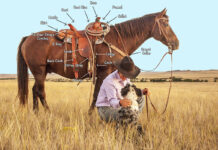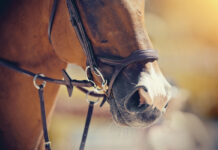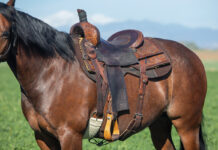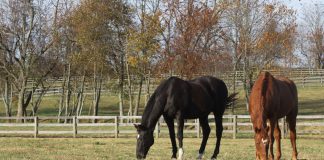Q: I recently bought a 15-year-old mare. She seemed so sweet but when I brought her home, she became a completely different horse. At feeding time, she rears and kicks or turns her back end toward me and threatens to kick. If you try to take her away from food, she does the same thing. Sometimes she does it when she’s being longed. She gets along with other horses and she’s great under saddle, but I need to know how to stop her behavior from getting worse.
What you own is an alpha (boss) mare who is territorial about her food. She’s also attempting to assert her dominance over you by her displays on the longe line. As you’ve already figured out, her behavior is not only dangerous, but it will typically continue to get worse until you set some strict limits. Although we hear this term a lot in the horse world, it’s quite true: You need to explain to your new mare that you are the herd leader.
The problem with that concept, however, is that it requires a great deal of skill, timing and previous experience dealing with aggressive horses to be safe, humane and successful. You need to know how to read a horse’s body language so you can tell when it’s time to step up and exert your authority and when it’s time to get out of the way of a possible bite, kick or strike. So I urge you to consult with a local professional in your area. It needn’t be a show horse trainer. Look for a community instructor associated with the 4H or Pony Club or a natural horsemanship advocate with perhaps a working cowboy background. They will work with your horse and also teach you how to apply the same techniques.
Primarily what your mare needs is structured groundwork. Right now she is dictating when, and under which circumstances, she will allow you to invade her space. With a knowledgeable handler she’ll learn to yield to you. They should use a combination of voice commands, authoritative body language and a carriage whip (similar to a longe line but with a shorter lash) to convey their commands. Please don’t worry about the use of a whip. It’s nothing more than an instructional aid. It hardly compares to the teeth and hooves your mare is using to keep you in line. And although your teenaged mare has probably developed this bad behavior over many years, she can still be taught to envision you as the new alpha mare. Once she sees you in that role you’ll have a much safer, and much more enjoyable, relationship.
— Cindy Hale
Ask your questions on the HorseChannel.com Forums >>
See more Expert Q&As >>
Submit your Ask the Expert question >>






Good advise, get some friends to help out. That mare has alot more experience at being boss, and may not be willing to give up her crown so willingly.
Thanks for this article. My Appaloosa mare is starting to behave the same way. I guess I need to set some limits on her behavior.
The information provided in the answer was explained well and offered varied resources and understnding. Having experienced this behaviour in horses of my own the use of well constructed natural horsemanship has been successful.
Good Advice. Very true. The same thing happens with my horse, but thankfully I was able to find help, and now I am SO glad that I did.
Great article. Helpful to so many. Thank you!
Yes! i have had this problem the horse i ride is a 11 year old black mare an literally the sweetest horse i will ever know! But one day she did something that she has never done in her 11 years of life! she kicked another horse (a horse she new very well) right in the side! everyone on the trail ride was shocked! since then iv noticed that every now and then she will have her marish moments. when she has those days i do alot of ground work with her and that seems to help her!. Thank you for the article it was very helpfull!
In my experience this mare would have slowely being getting disrespectful incrementally and steps were not taken when they should have been. The worst cases is where the horse is treated as a pet, which it is not! To show dominance over this mare involves moving her feet at your suggestion. This suggestion is backed up with whatever is necessary to get her moving. As she is likley to resent this initially, and maybe kick out, the reinforcement needs to be from a distance (carrot stick or lungeing whip). She does not need to be hit but she certainly needs to move when you say, and eventually with no resisitance.
My now-almost-3 year old gelding was very aggressive from the time he was born!!!! I’ve always been able to “manage” him but it wasn’t until a year ago that I was able to get the help I needed!!! I am SO thankful I found the person that helped me with him!!! Now I don’t have to “manage” my “problem child”, he has turned out to be very well mannered!!! He does have his moments but they are few and far between!!! The last time he challenged me was about 6 months ago when I was riding him. I was able to dismount and began working him from the ground. He thought he had the advantage because he out-weighs me but he learned that I am not going to back down from him and I will get his feet moving when I tell him the first time!!! Now he is easy to handle and fun to ride!!! When he tries to be dominate over my young colt with me in the middle all I have to do is point my finger at him and he backs off!!!
I bought a horse from a nearby Hunter barn that acted just fine when we looked at him. After getting home, that’s when the aggressive behavior started. We eventually got him under control but he is a horse who has a tendency to bite to this day. Sometimes we don’t learn from mistakes…we bought another horse from the same barn a couple of years later (for a student) and don’t you know it? That horse turned deadly aggressive after we brought him home!!! My guess is that at that other barn, the horses are dealt with very severely on a daily basis so they “behave”. After coming to our barn where we respect our horses and treat them gently (not like cuddly pets but definitely with a soft hand which our horses appreciate and thrive on) they turn into vindictive monsters! Also, don’t be surprised if some horses are drugged when you look at them….
Join Parelli Natural Horsemanship. Consult a Parelli Professional. Do not whip your horse.
The advice above i used with my 6 year old mare, my 4-h leader was and still is an amazing natural-horse-woman trainer, she loves horses but is an expert at teaching her students how to disipline their own horses and develops then into amazing horsepeople, my mare once my greatest fear is now my best friend and i trust her more than any other horse. Follow the advice in the article but i will add that i would watch the way the trainer handles ans trains before enlisting their help. 🙂 even the bible says, spare the rod and spoil the child same goes with horses they are agressive in the wild its natural for them
Round pen work-you chase HER away if she’s being aggressive. She can only run in a circle, & will eventually turn back into you. Eventually, hold her food, in bucket, out to her. If she doesn’t behave, chase her away again. You can leave her overnight there. Try for appropriate behavior next day. She won’t starve if she misses a feeding, or even 2!
&/or try her in cross ties. Great to teach manners, & sort of evens the odds (ha). You can even bring her food & feed her out of bucket while you’re holding it.
Aggressive behavior=no food. You provide the food, & her other needs, that makes YOU the “herd leader.”
Teach her manners, then enjoy her from now on! She deserves both.
This is a great conversation. Hope the comments keep coming in. I had a similar experience with my gentle, trained 6-yr old Appaloosa about six months after I brought him home. He turned his back & kicked out at me during feeding. Bad surprise!! I’m thinking this problem developed with my husband feeding him in the morning. I never feed my horse until/unless he backs away from the feed bucket, i.e., honoring my space. My husband was feeding the animals in a production line-type way, not really taking any time to guide my horse’s behavior (this was my fault, not my husband’s). Now my husband requires the same feeding discipline as I do each afternoon.
Also, I reinforce voice commands every day. I never give my horse treats unless he completes some small task I ask from him (e.g., backing, side stepping–both sides, etc.) by voice command. I never feed him until he comes to the gate to walk with me to the barn/stall/feed. I do this so he doesn’t stand in the stall waiting for me to come to him. He knows what he needs to do, is a really sweet and funny horse–loads of personality–and is good under saddle and on the trail.
My trainer has always said 90% of accidents happen on the ground; I believe that is true.
Linda, Austin, TX
csulcs
My POA mare used to be aggressive during ground work, too. I had let her believe she was the boss when I was younger and by the time I knew better, it was too late.
I re-established my leadership by free lounging in a round pen. Every time she approached me, I chased her off (the subordinate animal NEVER approaches the dominate in the herd). However, she would come at me aggressively in retaliation. To fix this, I got on another horse that was already dominate to the POA and is used for ranch work. When the POA kicked, the ranch mare kicked back. The POA now associates me with the ranch mare and I am able to safely continue ground work with her.
The moral is, there is always a safe and natural way to establish dominance and respect over a horse. Once dominance is established, the horse will not be aggressive toward you, but will need constant upkeep on their training and a watchful eye.
My horse is a bit like this too but only under saddle. A bit scary.